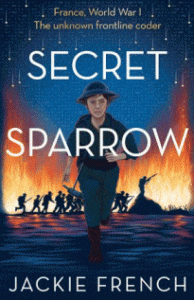
Secret Sparrow
Secret Sparrow
Jackie French
HarperCollins, 2023
256pp., pbk., RRP $A17.99
9781460760468
September 1978 and Arjun is walking to the local mall when he hears the roar of a flash flood approaching and sees the river become a turbulent mass of brown, white-flecked water with cars bobbing along like plastic bath toys. Miraculously a motor bike appears and he is urged to climb on, as the rider heads to the only high part of this flat landscape that should never have been built on – a grassy knoll that boasts only a small carpark and a rubbish bin on a pedestal.
As surprised as he is by the ferocity and the swiftness of the flood, he is even moreso when he discovers his rescuer is an elderly woman! And that she is a woman with an amazing story to tell as the waters rise and she makes him climb in the rubbish bin and use old newspapers for warmth and has the wisdom to know his thoughts need diverting from both the current situation and the fate of his mates trapped in the mall. It is a story of going from growing up in an English village during World War I to being commandeered into serving her country despite being only 16; to being torpedoed by a German U-boat while crossing the English Channel to living and working in the hell of the trenches of France… all because she learned Morse Code while competing with her older brothers and became so fast and accurate her skills had been noticed.
But this is not just Jean McLain’s story told to keep a young lad calm and distracted – this is the story of at least 3600 women who were used as signallers as she was during World War I who not only signed an oath that they would never divulge their role even decades after the war was over but whose service was never formerly recognised and so they received only their Post Office employee pay while they served and had to pay for their own medical treatment if they were injured, and whose army records were deliberately destroyed by the authorities because of their embarrassment at having to admit that they not only had to rely on women to serve, but the women had excelled. To have to admit that so many had been able to step up and cope in situations that required “physical strength, mechanical knowledge and the courage to work under fire” when such physical and emotional circumstances as war and its inevitable death were seen as “unwomanly”, was an anathema to many men and so not only were individual stories never told, they were lost altogether.
But, using her usual meticulous research, author Jackie French has brought it to light, as once again she winkles out those contributions of women to our history that seldom appear in the versions of history told by men. So as well as Arjun being so intrigued by Jean McLain’s story as the night passes, dawn appears and she teaches him to use her long-ago skills to summon help, our more mature, independent readers (and their teachers) can also learn something of that which we were never told. Because, apart from those in the roles like Jean McLain who could be prosecuted for sharing their wartime adventures even with their family, there was an unwritten code of the survivors of all wars that the horrors would not be shared because, apart from being horrific, unless you were there you would never understand. But now at the age my grandfather was when he died, I have learned a smidgeon of what it must have been like for him on the notorious Somme and can only wonder at how he went on to become who he did.
It is estimated that World War I claimed the lives of some 16 million people worldwide, 9.5 million of which were military deaths. It is also estimated that around 20 million were wounded, including 8 million left permanently disabled in some way. Of those lives lost, 54 000 were young Australian lads who were so eager to sign up for this grand new ‘adventure’ that they lied about their age and 18 000 young Kiwis who, like my grandfather, believed it was their duty to fight for “King and Country”. But only now, through stories like this and The Great Gallipoli Escape, are we learning the real story and through the questions she has her characters ask and answer are we being encouraged to question things for ourselves, not just about the war but also what we stand for. Often in the story Jean McLain is spurred on by her belief in her need to “do her duty” and that her actions are saving lives, but then she poses the same situation to Arjun. “What are we worth if we don’t do our duty to each other? What kind of life is it if you don’t love someone or something enough to die for them? What matters to you, eh?’
As well as teaching us about the past, French inspires us to think about the future – and that is a gift that only writers if her calibre can give our students.
